Meet a mother of 7 who runs a convenience store from her home in a graveyard, where the living coexist with the dead — but her family is set to be evicted in a few weeks
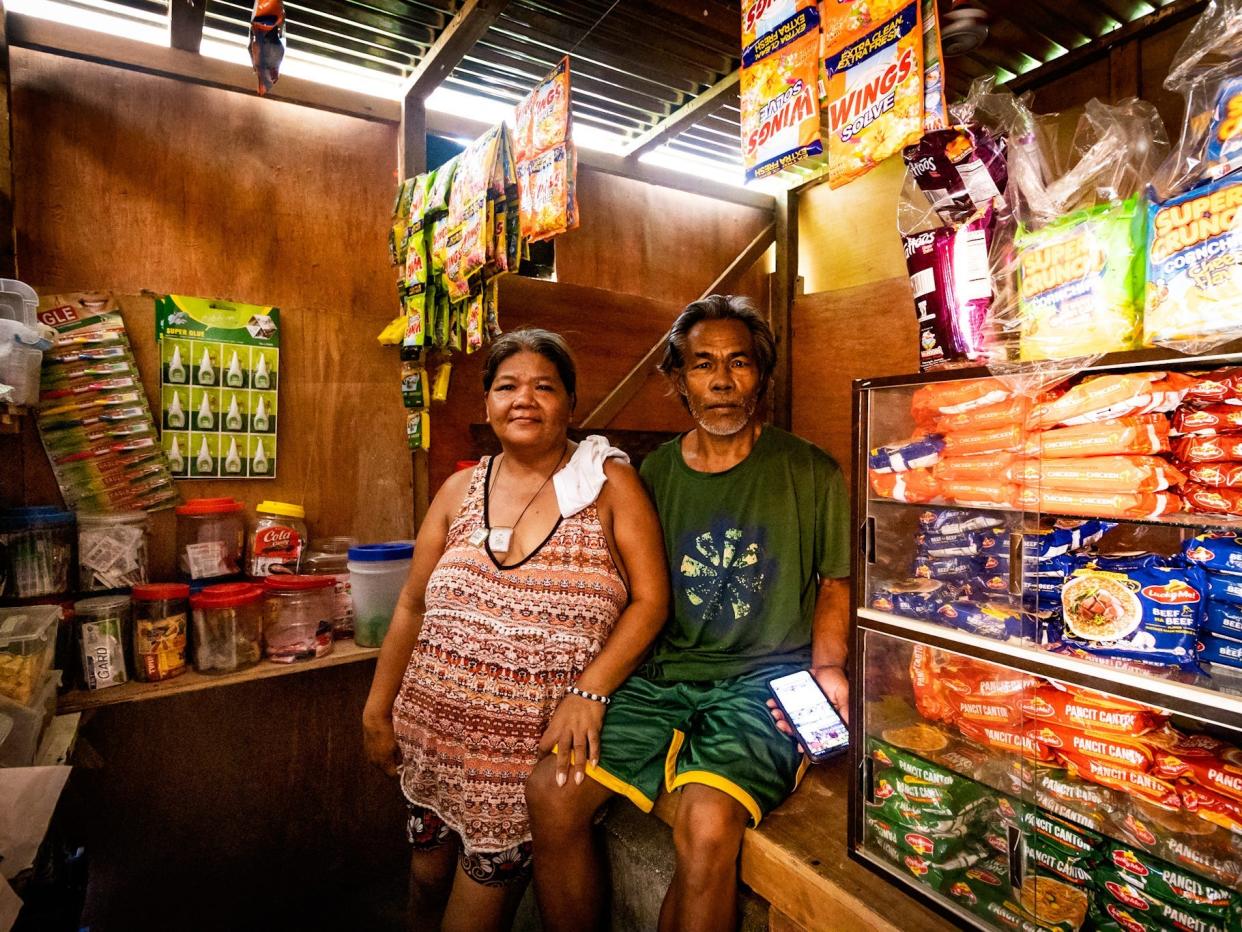
Several dozen families live in the Chinese Cemetery in Cebu, Philippines.
Gesophine Grama, a resident, runs a convenience store outside her home that's made out of a mausoleum.
All families will be evicted from the cemetery when the government begins converting it into a heritage park.
Gesophine Grama has lived in a cemetery in Cebu, an island-province in central Philippines, for 11 years. This is where she found solace after living in the harsh streets for many years.
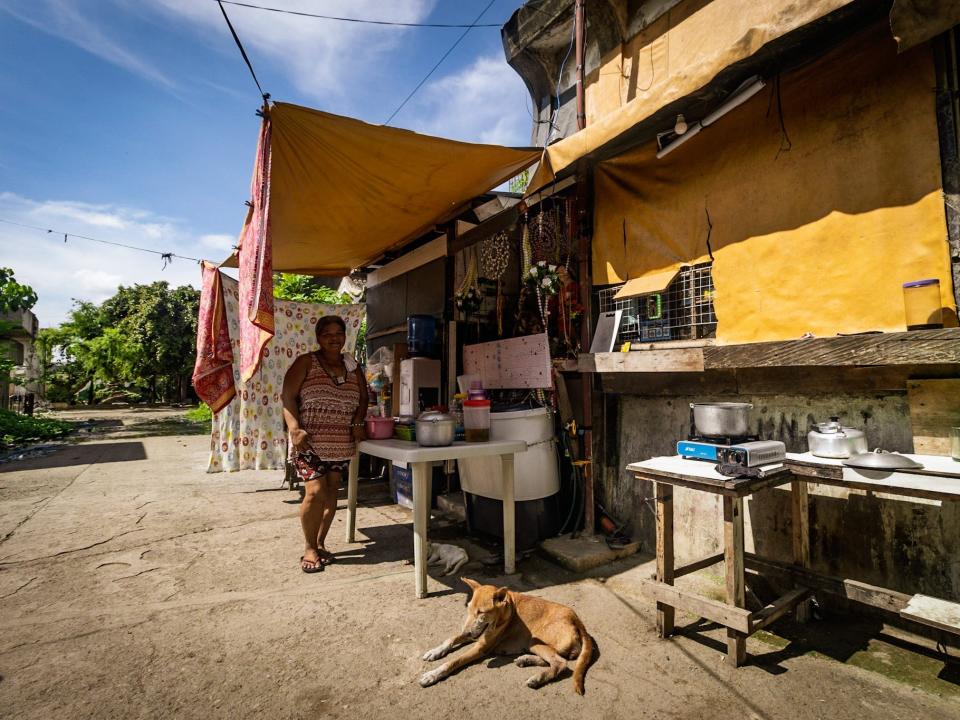
Grama hails from Leyte, a province that's some 125 miles away from Cebu. She moved to Cebu with her father, who worked at a pier for a shipping company. But when the company went bankrupt several years later, they were forced to live on the streets as they couldn't afford to pay rent.
Grama's luck changed when the caretaker of a local cemetery invited them to live there.
"The caretaker of the cemetery took pity on us and asked us to move into one of the mausoleums. We waited for a family to collect the corpse that was buried here," Grama, 43, told Insider on a visit to the cemetery in late June.
"When the body was excavated, we then had a place to stay," she said in Cebuano.
Grama lives in the Chinese Cemetery in Cebu's Carreta neighborhood. There, many Chinese-Filipinos are buried – but their graves are often in a dilapidated state or turned into makeshift houses.
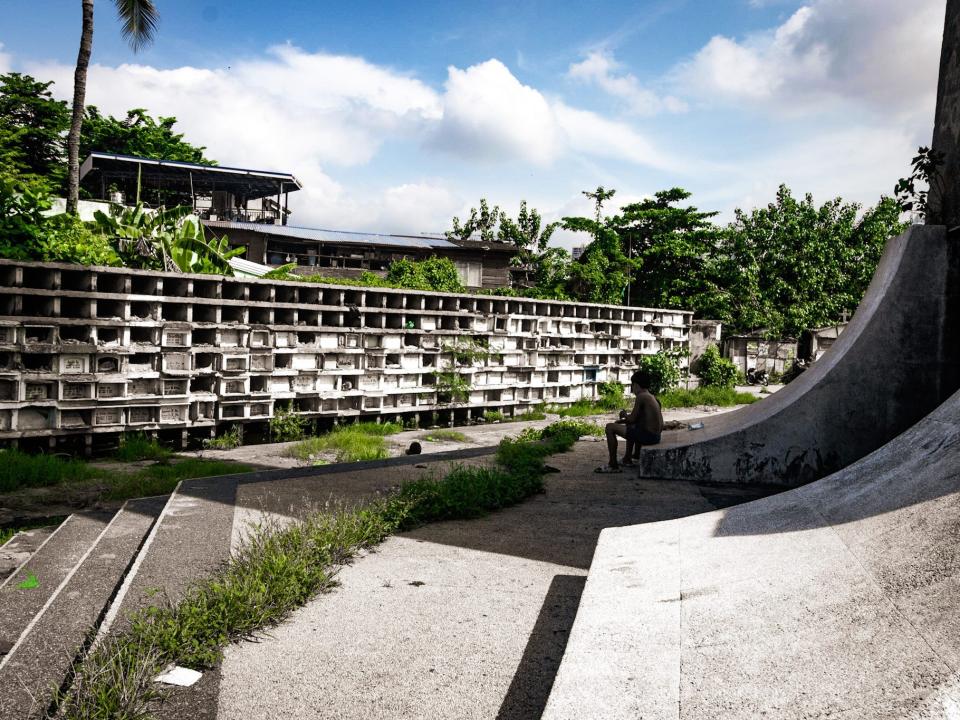
The Chinese Cemetery has existed for over a century. Many of Cebu's most highly esteemed Chinese-Filipinos were once laid to rest there. But for several decades, it's fallen into a state of disrepair.
Today, it's known as an informal settlement — what's described by the Philippine Statistics Authority as a place where people live "without title or right or without the owner's consent whether in urban or rural areas."
But some people — including Grama — are left with no choice but to live there. Some 20 million people live below the poverty line in the Philippines, which means they only have a monthly household income of 12,030 Philippine pesos, or $293, for a family of five. An estimated 4.5 million people in the Philippines are homeless, forcing many to live in informal settlements.
Most informal settlements are overcrowded with people. But when Insider visited the Chinese Cemetery, it was still sparsely populated, with only a few dozen communities living there.
Now, all the families living at the cemetery face eviction by the local government, as the area will be repurposed into a 100-million-peso, or $1.8 million, heritage park, according to local newspaper The Freeman. The reconstruction is set to begin on July 12, per the report.
Grama said she's aware that living there isn't legal.
"It's hard to look for a place to stay, so we're left with no choice but to stay here. That's something that people don't know — they assume that it's fine to live in a graveyard," Grama said, referring to the belief that it's legal to live in a cemetery.
Grama runs a convenience store right outside her home.
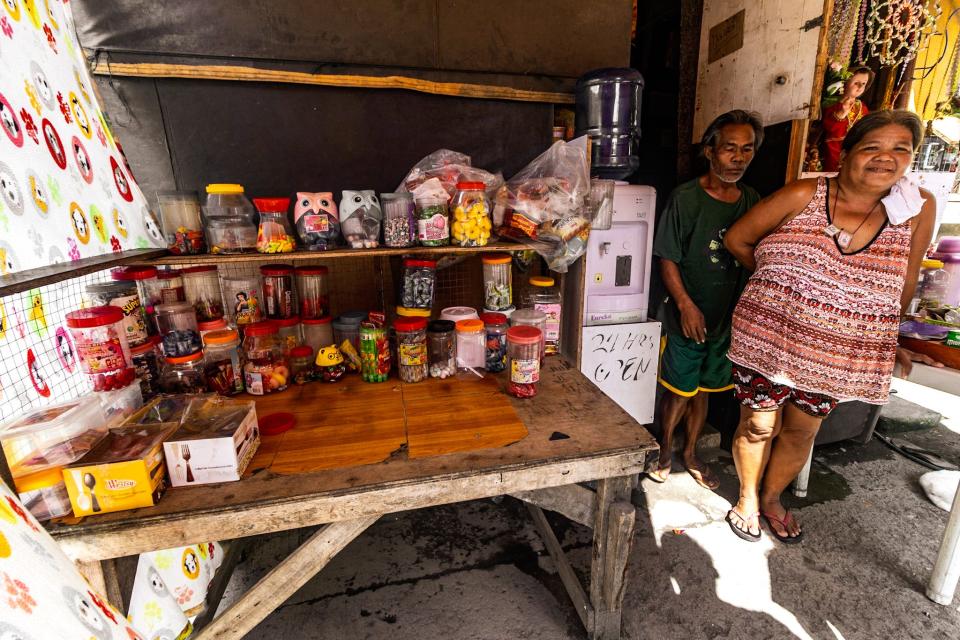
Her store, which comprises a wooden patio outside her 150-square-foot home and a small display where she keeps the goods, is patronized by people from around the neighborhood.
In the Philippines, shops like the one Grama runs are called "sari-sari stores," where people buy things like cheap cigarettes and snacks. They also meet up here to relax with friends. These shops are usually run by local families as a side business for additional income.
But for Grama, selling these things has been a full-time job and a lifeline for her family.
"Even when I lived by the road, I've been selling. So when I moved into the cemetery, business followed," Grama said.
"I sell groceries — items like biscuits, soft drinks, and cans of sardines," she added. These items cost around 10 to 20 pesos or around 20 to 40 cents.
Grama's sari-sari supports her entire family as her husband is unemployed — but it's been far from easy.

Grama has seven children with her husband, but only four of them — who are aged 21, 18, 14, and six years old — still live with them. The three eldest have married and two of them continue to live in the cemetery. One of them also runs their own convenience store.
Public elementary and high schools in the Philippines are free, and two of Grama's children attend them. But her sari-sari store barely makes enough money to give her young children pocket money for school.
The people who buy things from her shop don't have much money either — so the items are often taken but paid for later — what's known in the Philippines as "utang."
"It's an on-and-off business as sometimes I don't have money to buy supplies," she said, adding that most of the time she doesn't turn a profit.
"I feel for them as many of my customers are people I know personally. Sometimes they tell me they aren't going to be paid any time soon, so I just let them buy things from me as debt," she continued.
Grama's house is made from a repurposed mausoleum. Right outside, she has a water dispenser for clean water and a small shrine for her patron saint.
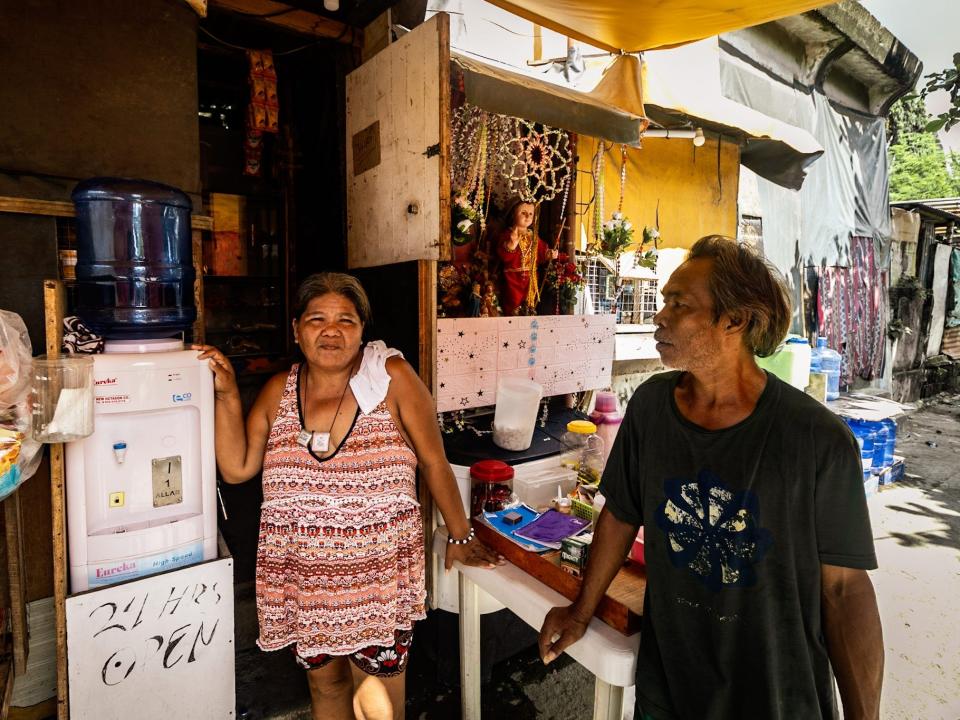
Grama's home is surrounded by foliage and tombs. It's eerie at night, she said, sharing that she used to have reservations about moving into a cemetery.
Like many Filipinos, Grama grew up familiar with death and graveyards. In the Philippines, many people celebrate All Saints Day on November 1. On this day, locals spend time at graveyards, clean their dead loved ones' tombs, and hang out with family and friends.
On the other hand, Filipino folklore also tells stories of people being haunted at graveyards and sightings of frightening creatures. But this didn't stop Grama and her family from seeking shelter at the cemetery.
"I got scared initially. When we were waiting for the mausoleum to be turned into our house, we would seek shelter here at 6 a.m., and leave at 5 p.m., as we were afraid of being in the dark here," Grama said.
Inside Grama's home, it's filled with her family's belongings and several electric appliances — including a flat-screen TV and a large fridge.
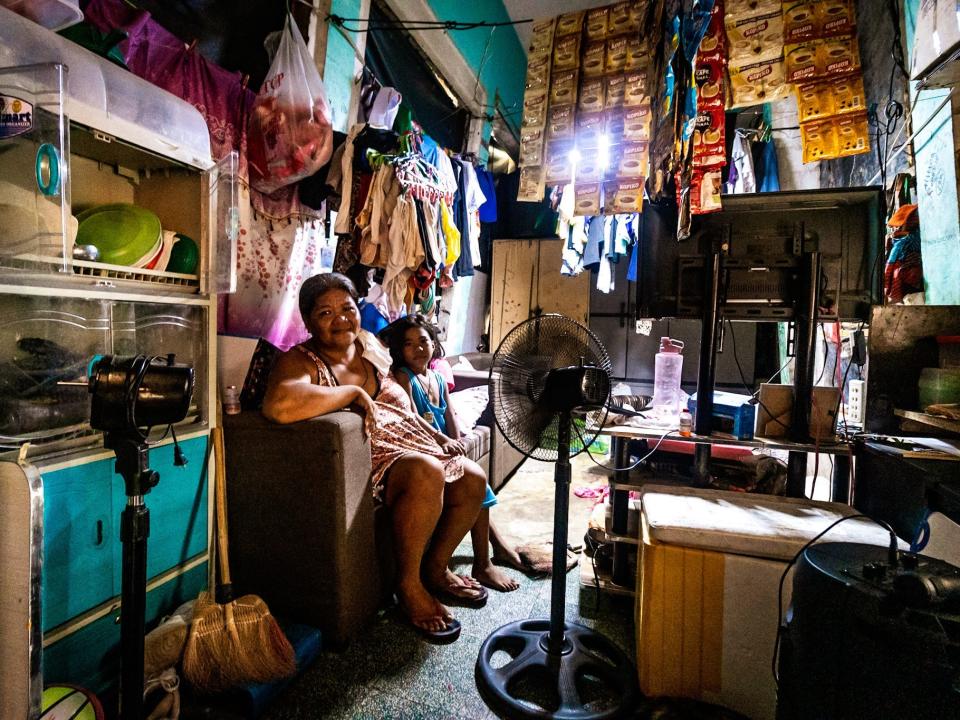
These big-ticket items, Grama said, are luxuries that were gifted by one of her children who moved to Negros, another island in central Philippines. Grama added that her grown child in Negros still supports them financially from time to time.
Of course, living in a cemetery comes with some unusual experiences.
When Grama first moved to the cemetery with her family, very few people wanted to live among the dead, she said — so they were often the only ones around. She said she had felt the presence of the supernatural while living there, and that she had seen ghosts like the "white lady" — a long-haired woman in a white dress that often has a darkened face — walking right outside her house.
"But I believe that these things are all in the mind," she said, adding that in recent years, more people have moved into the cemetery.
"Now we have neighbors, and we're no longer scared to live here," she added.
Grama's living area is just a few steps away from her sari-sari store. There she has several handbags and photos of her family.
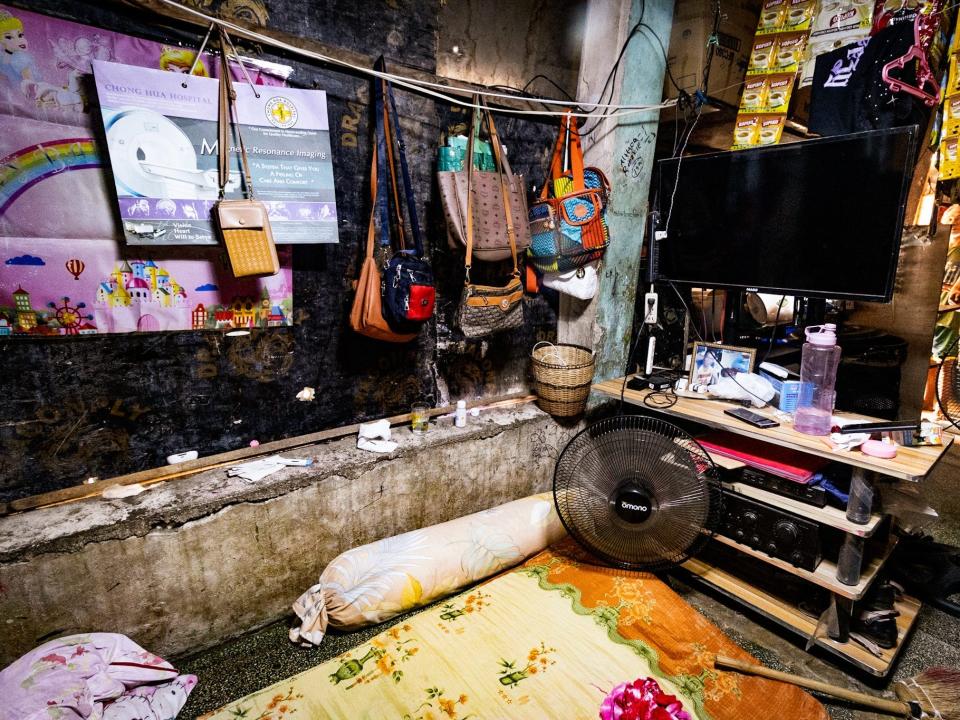
There, the stained walls show the remnants of the mausoleum that forms the house's shell. Inside, it's quiet, except for the occasional crows of the roosters from around the neighborhood. Outside, where the tombs are left to rot in black canal water, the stench of old garbage filled the air.
Grama said there are some challenges to living in the cemetery — but the small, cramped space of her house isn't one of them. As the neighborhood is an informal settlement, she said, it's often the site of police raids due to the increasing drug use there.
"We aren't even involved in these illegal things but we're affected too," she continued.
Grama's home has a small kitchen that was stocked with eggs and condiments. She said that most of the time, they eat what's available at their sari-sari store — instant noodles.
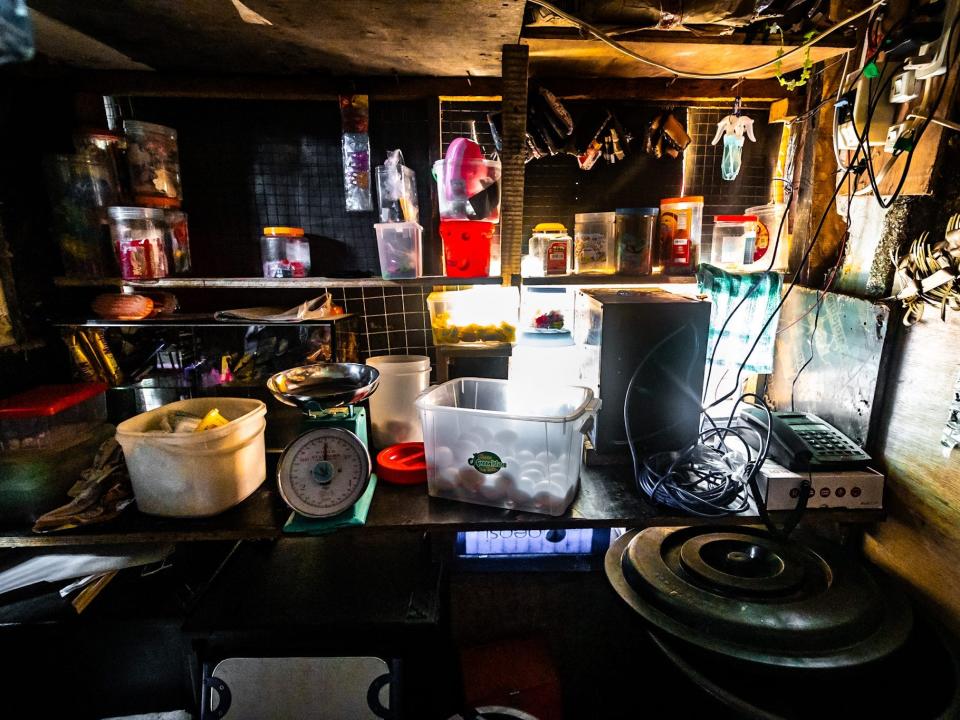
Grama said her family also occasionally eats the canned goods that they sell, which includes corned beef. Grama's kitchen didn't have a stove or a basin — she told Insider that she usually washes items outside her house.
Grama's house measures less than 160 square feet and doesn't have any individual rooms.
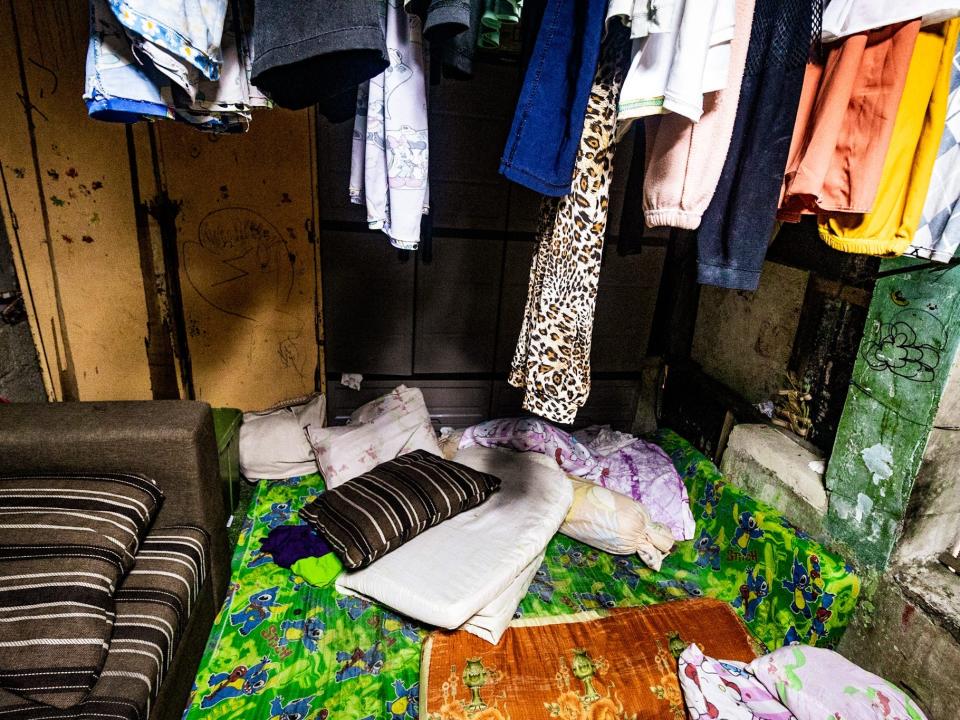
The bedroom forms half of the living area, where a thin mattress is placed and fresh laundry hangs overhead.
While living in a cemetery is a last resort for Grama, she feels grateful for the home she has made there.
"One of the upsides of living here is we don't have to pay rent," she said, adding that living in a cemetery is also much safer than sleeping on the streets.
Grama only has a few weeks at the cemetery before she and her family will be evicted — but she sounded hopeful.
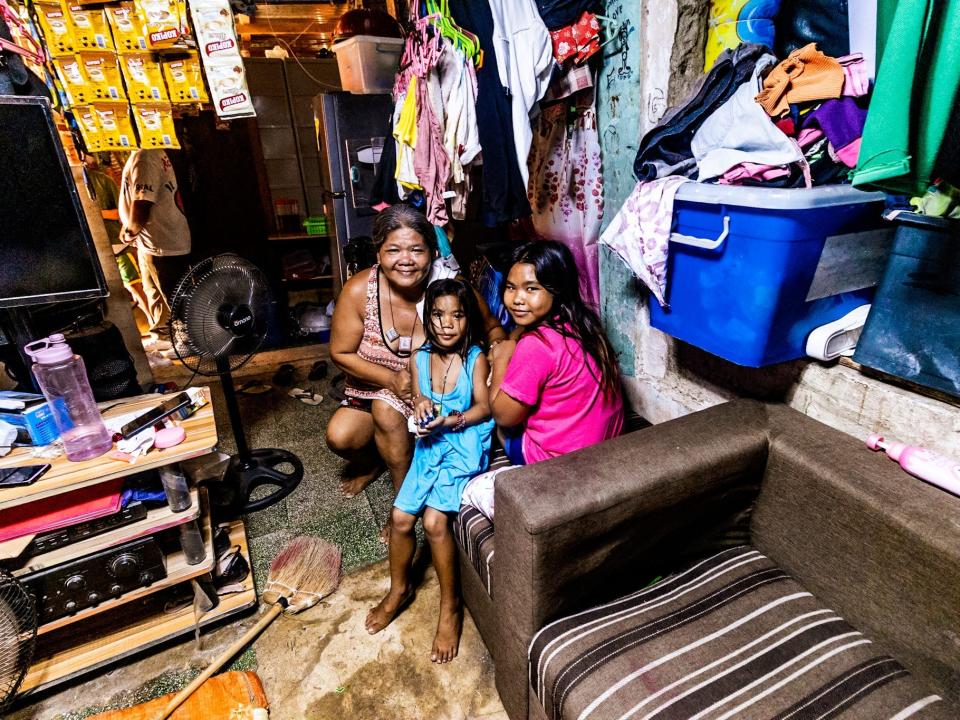
Grama said that she's dreamed of eventually leaving the cemetery and starting a new life elsewhere. But the cemetery has been a place that's provided her comfort from homelessness and surviving the harshness of living on the streets.
Now, she'll have to find a way to move her sari-sari store and her family somewhere else where they can be safe.
"I wish for us to have our own home that's permanent," Grama said.
"The hardships fade away when living here," she added.
Read the original article on Insider

